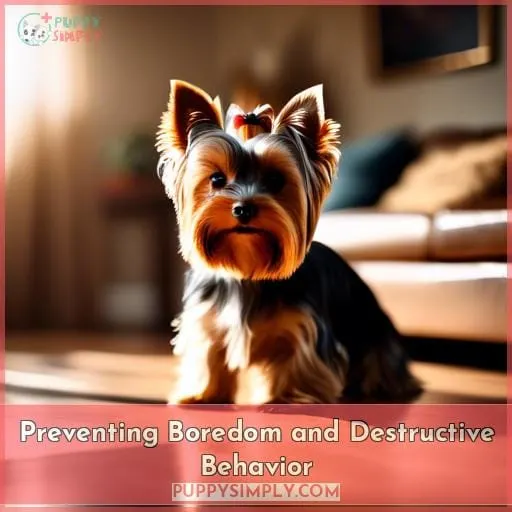This site is supported by our readers. We may earn a commission, at no cost to you, if you purchase through links.

How long can you leave your Yorkie alone without causing distress?
We’ll explore:
- Signs of distress
- How to prepare your Yorkie for solo time
- Options for long workdays
With expert advice, you’ll learn to balance your responsibilities with your Yorkie’s well-being.
Table Of Contents
- Key Takeaways
- Leaving Yorkie Alone
- Signs of Distress in Yorkie
- Preparing Yorkie for Being Home Alone
- Options for Long Workdays
- General Care and Attention
- Leaving a Yorkie Alone
- Training a Yorkie to Be Alone
- Preventing Boredom and Destructive Behavior
- Additional Tips for Leaving a Yorkie Alone
- Frequently Asked Questions (FAQs)
- How do I know if my Yorkie is comfortable being left alone?
- What are some signs of separation anxiety in Yorkies?
- How can I help my Yorkie cope with being left alone?
- What are some things I can do to make my Yorkie feel more secure when I’m away?
- Are there any special considerations I need to make if I have a puppy or senior Yorkie?
- Conclusion
Key Takeaways
- Start gradually increasing Yorkie’s alone time to prevent anxiety.
- Signs of distress in Yorkies include incessant barking, accidents inside the house, destructive behavior, excessive sleep, and unexplained weight loss.
- To prepare Yorkie for being home alone, gradually increase alone time, spend extra time in the morning before leaving, leave out food, water, and toys, and rotate toys regularly.
- For long workdays, consider having family members or pet sitters visit Yorkie, stopping by during lunch break, taking Yorkie to doggy daycare, bringing Yorkie to work, or working from home.
Leaving Yorkie Alone
When leaving your Yorkie alone, consider factors like their temperament, age, and health.
A young, healthy Yorkie with a calm temperament can handle solo time better than an older dog with health issues.
Start by gradually increasing their alone time to prevent separation anxiety.
Crate training can also help your Yorkie feel safe and secure when you’re away.
If you’ll be gone for an extended period, consider hiring a dog walker or pet sitter to check in on your furry friend.
Doggy daycare is another option for providing your Yorkie with socialization and exercise while you’re away.
Signs of Distress in Yorkie
Now that you’re aware of the conditions that make leaving your Yorkie alone feasible, let’s delve into the telltale signs that your furry friend is struggling with being left alone.
Watch out for:
- Incessant barking, especially if it’s high-pitched and frantic. This behavior often signals distress.
- Accidents inside the house, indicating your Yorkie’s inability to control their bladder or bowels due to anxiety.
- Destructive behavior, such as chewing on furniture or scratching at doors, can also manifest when your Yorkie is distressed.
Pay attention to:
- Their sleeping patterns; excessive sleep upon your return suggests they’re trying to escape their anxiety.
- Their weight; unexplained weight loss can be a sign of stress-induced loss of appetite.
If you notice any of these signs, it’s time to reassess your Yorkie’s alone time and consider alternative care options.
Preparing Yorkie for Being Home Alone
To prepare your Yorkie for being home alone:
- Gradually increase their alone time.
- Spend extra time with them in the morning before you leave.
- Leave out food, water, favorite toys, and interactive options to keep them occupied while you’re away.
Consider crate training your Yorkie to provide them with:
- A safe and comfortable space to retreat to when they’re feeling anxious or overwhelmed.
Gradually Increase Time
Start by leaving your Yorkie alone for short periods, gradually increasing the duration.
Patience is key – respect their comfort zone and expand it slowly.
Crate training or doggie daycare can ease anxiety during longer absences.
Extra Time in the Morning
Before heading out, devote extra quality time to your Yorkie in the morning.
Strengthen your bond through breakfast rituals and early interactions, setting a positive tone for their solo hours.
Leave Food, Water, and Toys
Make sure your Yorkie has plenty of food, water, and their favorite toys to keep them occupied while you’re away.
Stick to a feeding schedule.
Rotate toys regularly.
Ensure fresh water is always available.
Consider Crate Training
Crate training offers a haven of safety and comfort for your Yorkie while you’re away.
It can prevent destructive behaviors and accidents.
Techniques include:
- Positive reinforcement
- Gradual acclimation
- Creating a cozy, inviting space
Challenges may arise, but consistency, patience, and love lead to crate training success.
Options for Long Workdays
If you have long workdays, consider:
- Enlisting the help of a family member or hiring a pet sitter to visit your Yorkie during the day.
- Stopping in during your lunch break to check on your furry friend.
- Doggie daycare or bringing your Yorkie to work.
Enlist Help, Hire Sitter
If you’re facing long workdays, enlist a pet sitter to visit your Yorkie:
- Peace of mind knowing your furry friend is cared for.
- Personalized attention and playtime.
- Consistent routine and familiar face.
- Safe and secure home environment.
Stop in During Break
Break time with your pet can ease workday stress.
If your office is pet-friendly, schedule a midday check-in.
Say hello and ensure your Yorkie’s well-being.
Doggie Daycare or Bring to Work
Consider doggie daycare or bringing your Yorkie to work for longer workdays.
Daycare offers socialization, exercise, and structured play.
Workplace accommodations foster canine companionship and productive pups.
Work From Home
If hiring a pet sitter doesn’t fit your budget,
working a few days a week from home
can keep your Yorkie company
and maintain your productivity.
Exercise Before Leaving
Burning your Yorkie’s energy can prevent boredom and destructive behavior:
- Walk before work.
- Play fetch in the morning.
- Engage in tug-of-war.
- Hike on the weekend.
- Enroll in agility classes.
General Care and Attention
Leaving a Yorkie Alone
- Start by litter training your Yorkie to prevent accidents indoors while they’re alone.
- To train your Yorkie to be alone, gradually increase the duration of their solo time.
- Leave toys and turn on the TV to keep them company.
- Hire a dog walker for midday exercise to prevent boredom and destructive behavior.
Training and Boredom
Training your Yorkie to be alone will help prevent boredom and destructive behavior.
Start during summer months with short absences, gradually increasing duration.
Leave dog toys and turn on the TV for comfort.
Create a safe space for your furry friend and reward good behavior when returning home.
To combat boredom, provide a variety of interactive toys, engage in regular play and exercise, and rotate toys to maintain interest.
Puzzle toys stimulate mental activity, while safe chews deter chewing on furniture.
Litter Training
To ensure your Yorkie doesn’t have accidents inside while you’re away, litter training is crucial for housetraining.
Choose indoor or outdoor training based on your lifestyle and space.
Indoor training involves using potty pads, while outdoor training requires a consistent routine and behavioral cues.
Whichever method you select, consistency is key.
Establish a designated potty area, take your Yorkie there frequently, and reward them for successful elimination.
Patience and positive reinforcement will help your Yorkie master litter training, giving you peace of mind when you leave them alone.
Training a Yorkie to Be Alone
To teach your Yorkie to be alone:
- Start training in the summer when they’re more comfortable being alone.
- Gradually increase the duration of their alone time.
Provide interactive toys and turn on the TV to keep them occupied and comfortable while you’re away.
Summer Months
Alone whack-a-doodle-do-list:
Start in summer. Heat’s a hassle, but Yorkies thrive on outdoor adventures.
Beach fun, hiking trails, park dates – summertime’s a Yorkie wonderland.
Short Absences
- Start with brief departures, gradually extending duration as your Yorkie adapts.
- Build coping mechanisms and reduce separation anxiety.
Dog Toys and TV
Use toys and TV to comfort your dog during brief absences.
Select toys that challenge and engage, and choose TV programming that provides calming or entertaining canine entertainment.
These tactics help stave off boredom busters and stimulate your Yorkie’s mind.
Safe and Comfortable Space
Designate a cozy corner with comfortable bedding and a secure enclosure.
Ensure it’s a calm, familiar space that offers a relaxing environment and a cozy hideaway for your Yorkie’s solace.
Reward Good Behavior
Rewarding your Yorkie’s good behavior during solo time reinforces positive associations with being alone.
This behavioral training technique strengthens their understanding of acceptable behavior, promoting a sense of control and safety.
Preventing Boredom and Destructive Behavior
To prevent boredom and destructive behavior while you’re away:
- Provide a variety of engaging toys.
- Engage in regular play and exercise sessions.
- Consider puzzle toys to stimulate your Yorkie’s mind.
Rotate toys to maintain interest and offer safe chews to prevent chewing on furniture.
Interactive Toys
Since boredom can lead to destructive behavior, provide your Yorkie with a variety of interactive dog toys to keep them engaged and entertained while you’re away.
These toys stimulate their minds, providing enrichment activities and mental stimulation.
Regular Play and Exercise
- Exercise routines and playtime activities prevent boredom and destructive behavior.
- Engage in outdoor adventures for mental stimulation and bonding opportunities.
Rotate Toys
To keep your Yorkie mentally stimulated and prevent boredom:
- Rotate their toys regularly, providing a diverse range of activities.
- Challenge their intellect with mentally stimulating toys.
Puzzle Toys
When left to their own devices,
keep your Yorkie engaged with puzzle toys
that challenge their intelligence,
curb boredom,
and prevent destructive behavior.
Safe Chews
To prevent chewing on furniture and boredom-induced destruction, offer your Yorkie durable, dog-friendly chews.
Choose chew toy options that promote dental health and are safe for supervised chewing.
Teething solutions and chew safety should be top of mind when selecting chews.
Additional Tips for Leaving a Yorkie Alone
Establish a routine for your Yorkie.
Leave a piece of clothing with your scent on it.
Consider calming aids like pheromone diffusers to make them feel more secure while they’re alone.
Monitor their behavior for signs of stress or anxiety.
Consult a veterinarian or animal behaviorist if problems persist.
Routine for Dog
Establish a consistent routine for your Yorkie to follow while you’re away, creating structure and predictability that eases their anxiety and promotes good behavior.
Provide your Yorkie with a safe and comfortable space in your home where they can relax and feel secure.
Make sure your Yorkie has access to fresh water and food at all times.
Take your Yorkie for a walk or play with them before you leave to help them burn off energy and reduce boredom.
Leave a piece of clothing or a blanket with your scent on it with your Yorkie to provide comfort and familiarity.
Consider hiring a pet sitter or dog walker to check in on your Yorkie while you’re away to provide companionship and ensure their well-being.
Piece of Clothing With Scent
Since Yorkies form strong bonds with their owners,
leaving a piece of clothing with your scent on it can provide scented comfort,
reduce canine anxiety, and
offer emotional reassurance while you’re away.
Calming Aids
Consider using calming aids like pheromone diffusers to help soothe your Yorkie’s anxiety while they’re home alone.
Natural remedies:
- Calming herbs and supplements
Behavioral techniques:
- Desensitization and counterconditioning
Environmental enrichment:
- Interactive toys
- Calming music
Monitor Behavior
After setting up calming aids, diligently monitor your Yorkie’s behavior for any signs of stress or anxiety.
Behavior monitoring helps:
- Adjust training techniques
- Mental stimulation
- Ease separation anxiety
Comfort measures to ease separation anxiety:
- Adjust training techniques
- Mental stimulation
- Comfort measures
Consult Veterinarian
If problems persist, consult your veterinarian or an animal behaviorist for:
- Veterinary guidance
- Health considerations
- Behavioral assessment
- Medical advice
Frequently Asked Questions (FAQs)
How do I know if my Yorkie is comfortable being left alone?
To gauge your Yorkie’s comfort when left alone, observe their behavior closely.
Notice if they exhibit signs of distress like:
- Excessive barking
- Destructive behavior
- Accidents indoors
A relaxed and content demeanor indicates comfort, while these signs may suggest a need for adjustments to make them feel more secure.
What are some signs of separation anxiety in Yorkies?
Excessive barking.
Accidents indoors.
Destructive behavior.
Lethargy after reunions.
Weight loss.
These can all signal separation anxiety in your Yorkie.
How can I help my Yorkie cope with being left alone?
To ease your Yorkie’s solitary confinement:
- Establish a sanctuary of comfort.
- Engage their intellect with interactive toys.
- Foster independence through gradual departures.
What are some things I can do to make my Yorkie feel more secure when I’m away?
Create a safe haven for your Yorkie:
- Familiar scents, favorite toys, and calming music to ease anxiety.
- Provide comfort during your absence.
Are there any special considerations I need to make if I have a puppy or senior Yorkie?
Absolutely, special care is crucial.
Puppies need more frequent attention.
Seniors may require shorter alone time due to health concerns.
Conclusion
As a Yorkie owner, you’re tasked with balancing your responsibilities with your furry friend’s well-being.
By understanding signs of distress, preparing your Yorkie for solo time, and exploring options for long workdays, you can ensure your Yorkie’s happiness and well-being while you’re away.
Keep in mind, every Yorkie is different, so tailoring your approach to their individual needs is key to successful solo time.















